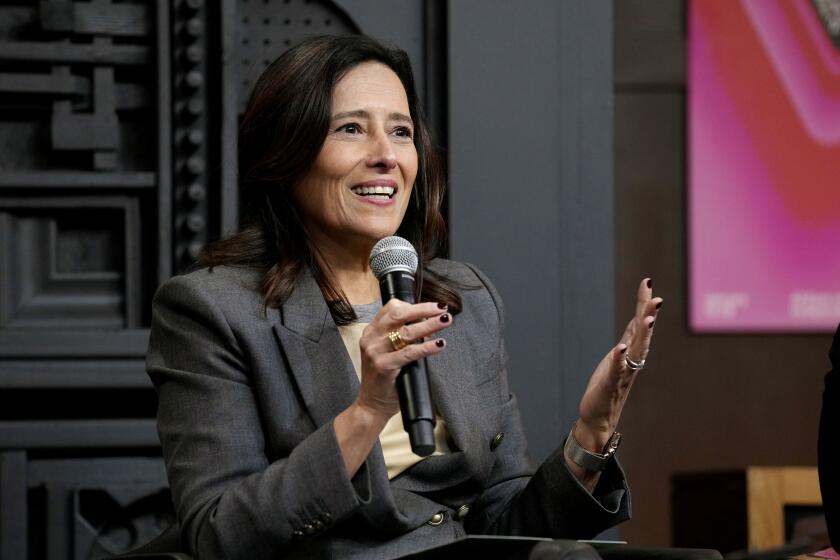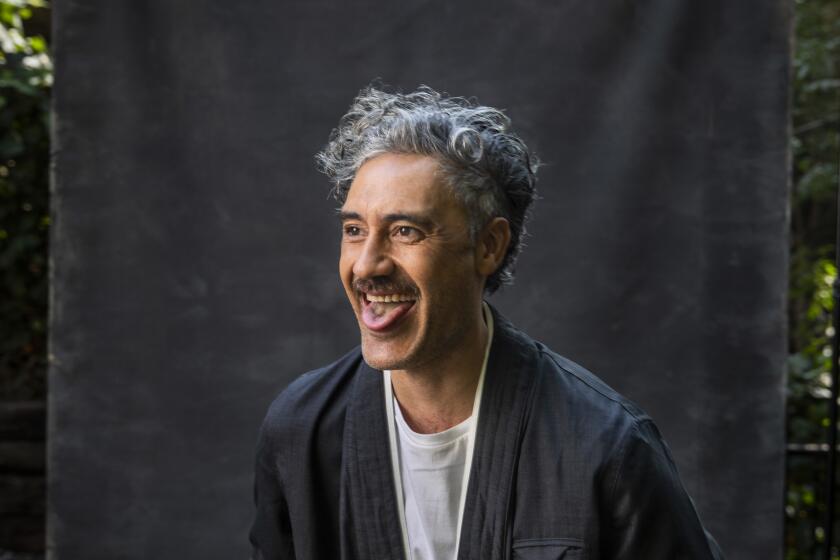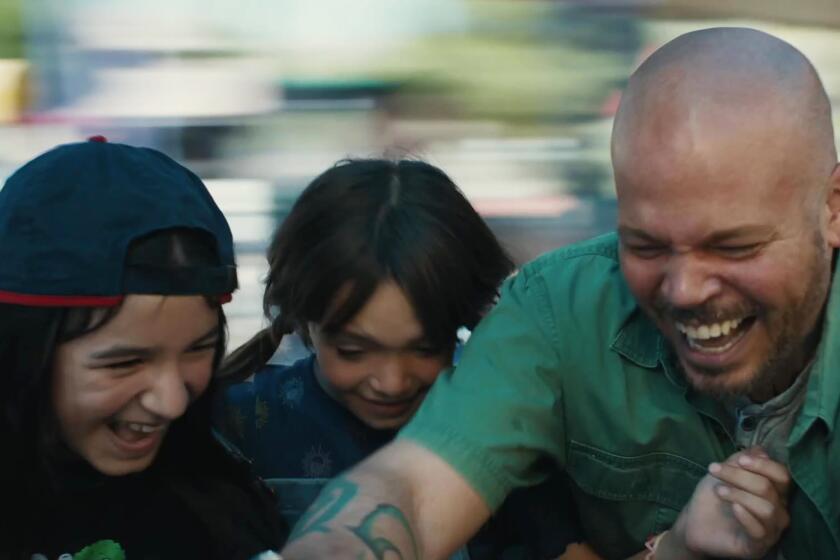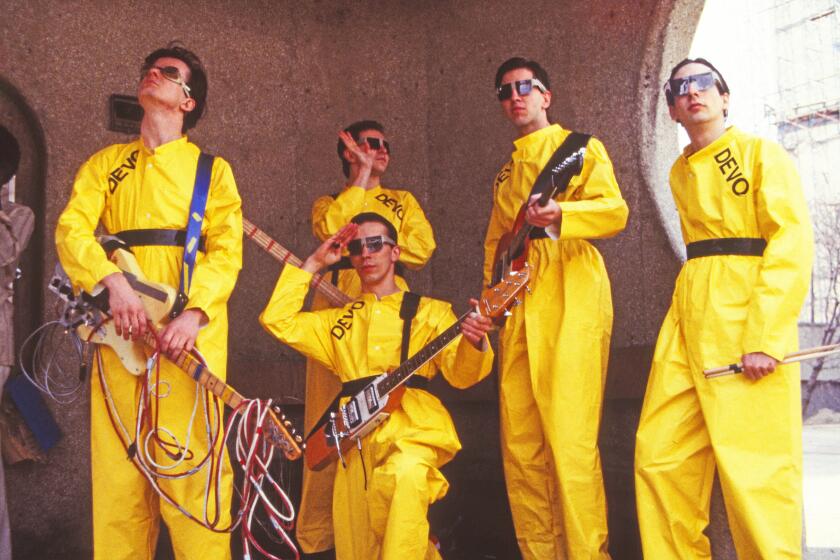Toronto Film Festival Critic’s Notebook: ‘Knives Out’ slays, ‘Jojo Rabbit’ splutters
There are few things at the movies more potentially unifying, or alienating, than the sound of an audience’s laughter. At an event like the Toronto International Film Festival, where comedies reliably play to packed houses, your own enjoyment may well depend on how in sync you feel with the crowd going nuts around you.
Do you share gratefully in their laughter, knowing that it validates your own pleasure? Or do you find yourself slowly turning against the audience — and, inevitably, the movie that is inexplicably winning them over?
I’ve had both experiences here at Toronto this year, courtesy of two of the festival’s hottest tickets. At the gala premiere of Rian Johnson’s deliriously entertaining murder mystery “Knives Out,” I found myself at times forcibly constraining my laughter and eagerly pricking up my ears, so as not to miss a single scrap of dialogue or detail of the movie’s fiendish, flashback-heavy labyrinth of a plot. Johnson hasn’t just churned out a wink-wink spoof of the classical drawing-room mystery; as you might expect from the writer-director of “Looper” and “Star Wars: The Last Jedi,” with its ingenious twists and turns, he has crafted an intricate puzzle-box narrative worthy of the genre’s brainiest practitioners.
Agatha Christie will of course be everyone’s go-to reference point, though I think Johnson’s singular weave of hilarity and ingenuity owes more to the lesser-known John Dickson Carr, especially in the grandiloquent final round of explanations and explanations-within-explanations. You could get happily lost trying to pin down “Knives Out’s” various antecedents, from “Murder, She Wrote,” which a character is shown watching early on, to “The Last of Sheila,” a 1973 whodunit directed by Herbert Ross and written by Anthony Perkins and Stephen Sondheim. (Johnson was on hand to introduce a special TIFF revival screening of “The Last of Sheila” on Sunday.)
Happily, “Knives Out” more than lives and breathes on its own. The splendid all-star ensemble includes Jamie Lee Curtis, Don Johnson, Michael Shannon, Chris Evans and Toni Collette, all playing close relatives of a filthy-rich mystery writer named Harlan Thrombey (played with his signature twinkle by Christopher Plummer) who, in short order, will be known as the deceased.
Who slit the old man’s throat one night in the attic of his fabulously ramshackle abode? Who anonymously paid a private investigator (Daniel Craig, clearly relishing the opportunity to do a Southern accent) to come around and stick his nose into the suspects’ private affairs?
It falls to Harlan’s beloved nurse, Marta (a terrific Ana de Armas), to solve the mystery, a choice that makes satisfying sense in more ways than one. Marta is an outsider, a Latin American immigrant — the family’s inability to remember her country of origin becomes a withering running gag — and the Thrombeys, despite their showy insistence that she’s a member of the clan, clearly regard her as a lesser, lower entity.
Ahead of the “Knives Out” premiere at the Toronto Film Festival, writer-director Rian Johnson explains its connection to the song by Radiohead.
It would be, well, criminal to give away “Knives Out’s” extraordinarily clever solution, which deserves to be experienced fresh when Lionsgate releases the movie theatrically Nov. 27. But I don’t think it’s revealing too much to say that this is an overtly and satisfyingly political entertainment, in which the various twists and turns dovetail into an acerbic takedown of our country’s most entitled.
That subtext puts “Knives Out” in excellent company here at Toronto, where Bong Joon-ho’s masterful domestic thriller “Parasite,” winner of the Palme d’Or at Cannes earlier this year, has been a major word-of-mouth sensation. Far more divisive, but similarly barbed in its eat-the-rich messaging, is Todd Phillips’ “Joker,” which arrives in Toronto fresh from its triumph at the Venice Film Festival, where it won the Golden Lion. I’m not sure what it says that the two biggest European festivals this year handed their top prizes to a pair of darkly comic thrillers with something vicious and pointed to say about class warfare, but they both serve to explode the idea that genre entertainment must always be a purely escapist undertaking.
Genre and politics go similarly hand-in-hand in “Jojo Rabbit,” a child’s-eye spoof of Hitler and the Third Reich from New Zealand writer-director Taika Waititi (“Thor: Ragnarok,” “Hunt for the Wilderpeople”), though the combination feels a lot closer to oil-and-water by the end of this visually sparkling, terminally self-satisfied provocation.
Set during the final days of World War II, with the Allies closing in on Germany, Waititi’s movie takes its title from a cruel nickname given to Jojo Betzler (Roman Griffin Davis), a pint-sized 10-year-old Nazi wannabe who has long conversations with his own imaginary-friend version of Hitler (played by Waititi himself).
Waititi is a spry and resourceful comic performer, and his angry-affectionate turn, although sure to make a few audience members queasy, falls into a long, proud and eminently defensible cinematic tradition of Hitler ridicule. Still, I hesitate to cite the likes of Charlie Chaplin’s “The Great Dictator” or Ernst Lubitsch’s “To Be or Not to Be,” lest you think I’m putting “Jojo Rabbit” in anywhere near the same league.
While I’m as tickled as anyone by the idea of a Polynesian Jewish man impersonating one of history’s greatest monsters, the notion of a comically flailing, wisecracking Führer — who says things like “Correctamundo!” and upbraids Jojo for not enunciating “Heil, Hitler!” correctly — turns out to be a lot funnier on paper than it is onscreen. And it isn’t that funny on paper.
Writer-director-star Taika Waititi made the Nazi comedy “Jojo Rabbit” as a tribute to single moms, with a character played by Scarlett Johansson.
It also feels like a feint, a dodge, a dash of vinegar to help you swallow a thick dose of Holocaust-drama treacle. “Jojo Rabbit” pivots on the friendship between Jojo and a Jewish girl, Elsa (a very good Thomasin McKenzie), whom he finds hiding in his late sister’s bedroom, and their slowly developing bond will in turn help facilitate his realization that Jews are not, in fact, the subhuman scourge that the Nazis in his midst (played by Sam Rockwell, Rebel Wilson, Alfie Allen, Stephen Merchant and others) say they are — at which point, “Jojo Rabbit” starts to feel like a Wes Anderson remake of “The Boy in the Striped Pajamas.” It’s “Life Is Beautiful if You Let the Right One In.”
Don’t get me wrong. At a moment when anti-Semitism, neo-Nazism and white supremacy are enjoying a hideous global resurgence, I’m hardly opposed to the notion of an accessible, entertaining movie that advances a warm-hearted, child-friendly message of tolerance, humanity and Hitler-dunking. Nor am I against the idea of confronting children with something genuinely dark and audacious, especially given how quick the film industry usually is to infantilize its youngest consumers.
But “Jojo Rabbit” is not that something. Set to open Oct. 18 through an under-new-management Fox Searchlight Pictures, it may fit a Disney executive’s notion of edgy, but its so-called audacity smacks of calculation and emotional cowardice. That’s especially true with regard to the sentimentalized character of Jojo’s mother (Scarlett Johansson), whose every onscreen moment exists only to vacate your tear ducts at movie’s end — right down to a single camera movement that, if I may borrow a few words from Jacques Rivette, deserves nothing but the most profound contempt. I began this piece noting that there are few things more potentially alienating than the sound of an audience’s laughter, but if “Jojo Rabbit” has anything to teach us, it’s that sniffles can be an even greater divider.
More to Read
Only good movies
Get the Indie Focus newsletter, Mark Olsen's weekly guide to the world of cinema.
You may occasionally receive promotional content from the Los Angeles Times.









